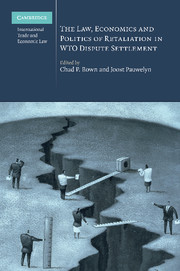Book contents
- Frontmatter
- Contents
- List of tables and figures
- Contributors
- Introduction: trade retaliation in WTO dispute settlement: a multi-disciplinary analysis
- PART I Background and goal(s) of WTO retaliation
- PART II A legal assessment after ten arbitration disputes
- PART III An economic assessment after ten arbitration disputes
- PART IV The domestic politics and procedures for implementing trade retaliation
- PART V Problems and options for reform
- PART VI New frontiers and lessons from other fields
- 21 Cross-retaliation and suspension under the GATS and TRIPS agreements
- 22 Cross-retaliation in TRIPS: issues of law and practice
- 23 Preliminary thoughts on WTO retaliation in the services sector
- 24 Compensation assessments: perspectives from investment arbitration
- 25 Reforming WTO retaliation: any lessons from competition law?
- Index
21 - Cross-retaliation and suspension under the GATS and TRIPS agreements
Published online by Cambridge University Press: 26 February 2010
- Frontmatter
- Contents
- List of tables and figures
- Contributors
- Introduction: trade retaliation in WTO dispute settlement: a multi-disciplinary analysis
- PART I Background and goal(s) of WTO retaliation
- PART II A legal assessment after ten arbitration disputes
- PART III An economic assessment after ten arbitration disputes
- PART IV The domestic politics and procedures for implementing trade retaliation
- PART V Problems and options for reform
- PART VI New frontiers and lessons from other fields
- 21 Cross-retaliation and suspension under the GATS and TRIPS agreements
- 22 Cross-retaliation in TRIPS: issues of law and practice
- 23 Preliminary thoughts on WTO retaliation in the services sector
- 24 Compensation assessments: perspectives from investment arbitration
- 25 Reforming WTO retaliation: any lessons from competition law?
- Index
Summary
Background and context
This chapter discusses the rules and procedures for cross-retaliation under the Dispute Settlement Understanding (DSU) and relevant dispute settlement practice and problems arising in the context of suspension of concessions or other obligations under the GATS and the TRIPS Agreement. Under the DSU, countermeasures in response to noncompliance with Dispute Settlement Body (DSB) recommendations and rulings are subject to certain disciplines. Most importantly, Articles 22 and 23 of the DSU require prior authorization of suspension of concessions or other obligations by the DSB. Article 22.4 provides that the level of suspension must be equivalent to the nullification or impairment resulting from non-compliance with DSB recommendations or rulings. According to Article 22.8, suspension shall be temporary and be applied only until such time as the measure found to be inconsistent with a covered agreement has been removed or another mutually satisfactory solution is achieved. In principle, countermeasures are to be taken in the same trade sector and under the same covered agreement in respect of which the DSB made recommendations and rulings. However, the DSB may authorize suspension of concessions or other obligations across trade sectors, or under another agreement, provided that the requirements and conditions set out in Article 22.3 for so-called cross-retaliation are met.
Some similarities, and some differences, exist with public international law standards on countermeasures, as reflected in the International Law Commission's Draft Articles on State Responsibility. For example, countermeasures must be ‘commensurate with the injury suffered, taking into account the gravity of the internationally wrongful act and the rights in question.’
- Type
- Chapter
- Information
- Publisher: Cambridge University PressPrint publication year: 2010



